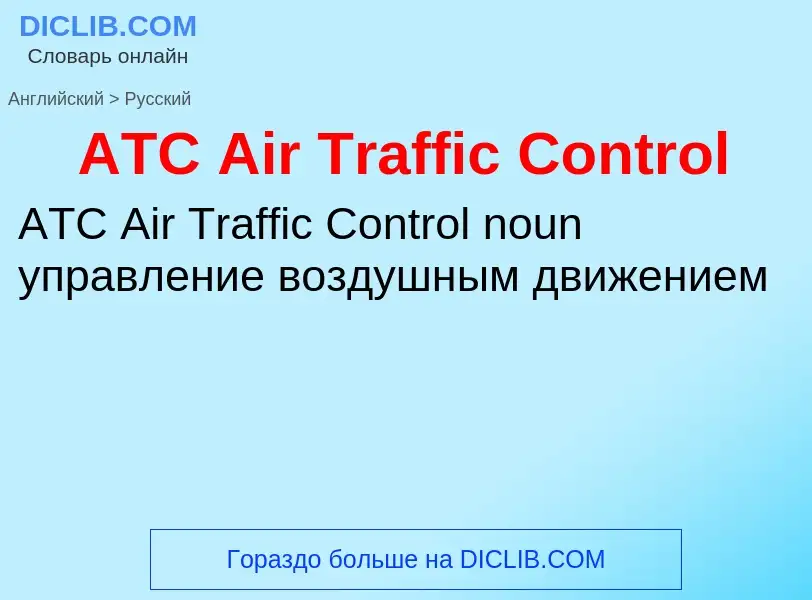Übersetzung und Analyse von Wörtern durch künstliche Intelligenz ChatGPT
Auf dieser Seite erhalten Sie eine detaillierte Analyse eines Wortes oder einer Phrase mithilfe der besten heute verfügbaren Technologie der künstlichen Intelligenz:
- wie das Wort verwendet wird
- Häufigkeit der Nutzung
- es wird häufiger in mündlicher oder schriftlicher Rede verwendet
- Wortübersetzungsoptionen
- Anwendungsbeispiele (mehrere Phrasen mit Übersetzung)
- Etymologie
ATC Air Traffic Control - Übersetzung nach Englisch
[kən'trəultauə]
авиация
диспетчерская вышка
контрольно-диспетчерский пункт
строительное дело
контрольная башня (вышка), башня управления полётами самолётов
Definition
Wikipedia

Air traffic control specialists, abbreviated ATCs, are personnel responsible for the safe, orderly, and expeditious flow of air traffic in the global air traffic control system. Usually stationed in air traffic control centers and control towers on the ground, they monitor the position, speed, and altitude of aircraft in their assigned airspace visually and by radar, and give directions to the pilots by radio. The position of air traffic controller is one that requires highly specialized knowledge, skills, and abilities. Controllers apply separation rules to keep aircraft at a safe distance from each other in their area of responsibility and move all aircraft safely and efficiently through their assigned sector of airspace, as well as on the ground. Because controllers have an incredibly large responsibility while on duty (often in aviation, "on position") and make countless real-time decisions on a daily basis, the ATC profession is consistently regarded around the world as one of the most mentally challenging careers, and can be notoriously stressful depending on many variables (equipment, configurations, weather, traffic volume, traffic type, special activities, governmental actions, human factors). Many controllers, however, cite high salaries, and a large, unique, and privileged degree of autonomy as major advantages of their jobs.
Although the media in the United States frequently refers to them as air controllers, or flight controllers, most air traffic professionals use the term air traffic controllers, ATCOs, or controllers. For a more detailed article on the job itself, see air traffic control.


![Civilian air traffic controllers, [[Memphis International Airport]], 1962 Civilian air traffic controllers, [[Memphis International Airport]], 1962](https://commons.wikimedia.org/wiki/Special:FilePath/Civilian air traffic controllers, Memphis.jpg?width=200)
![Controllers often work from a control tower like this one at [[Birmingham Airport]], England Controllers often work from a control tower like this one at [[Birmingham Airport]], England](https://commons.wikimedia.org/wiki/Special:FilePath/Control tower at Birmingham Airport, England 27June2019 arp.jpg?width=200)
.jpg?width=200)
